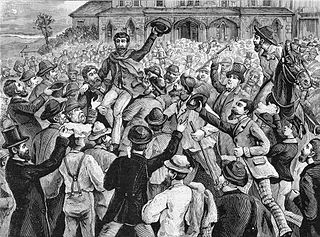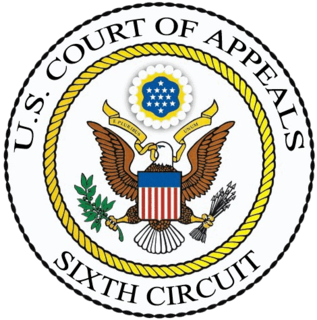Personal jurisdiction is a court's jurisdiction over the parties, as determined by the facts in evidence, which bind the parties to a lawsuit, as opposed to subject-matter jurisdiction, which is jurisdiction over the law involved in the suit. Without personal jurisdiction over a party, a court’s rulings or decrees cannot be enforced upon that party, except by comity; i.e., to the extent that the sovereign which has jurisdiction over the party allows the court to enforce them upon that party. A court that has personal jurisdiction has both the authority to rule on the law and facts of a suit and the power to enforce its decision upon a party to the suit. In some cases, territorial jurisdiction may also constrain a court's reach, such as preventing hearing of a case concerning events occurring on foreign territory between two citizens of the home jurisdiction. A similar principle is that of standing or locus standi, which is the ability of a party to demonstrate to the court sufficient connection to and harm from the law or action challenged to support that party's participation in the case.

In common law jurisdictions, an acquittal certifies that the accused is free from the charge of an offense, as far as the criminal law is concerned. The finality of an acquittal is dependent on the jurisdiction. In some countries, such as the United States, an acquittal operates to bar the retrial of the accused for the same offense, even if new evidence surfaces that further implicates the accused. The effect of an acquittal on criminal proceedings is the same whether it results from a jury verdict or results from the operation of some other rule that discharges the accused. In other countries, the prosecuting authority may appeal an acquittal similar to how a defendant may appeal a conviction.
International Shoe Co. v. Washington, 326 U.S. 310 (1945), was a landmark decision of the Supreme Court of the United States in which the Court held that a party, particularly a corporation, may be subject to the jurisdiction of a state court if it has "minimum contacts" with that state. The ruling has important consequences for corporations involved in interstate commerce, their payments to state unemployment compensation funds, limits on the power of states imposed by the Due Process Clause of the Fourteenth Amendment, the sufficiency of service of process, and, especially, personal jurisdiction.

Minimum contacts is a term used in the United States law of civil procedure to determine when it is appropriate for a court in one state to assert personal jurisdiction over a defendant from another state. The United States Supreme Court has decided a number of cases that have established and refined the principle that it is unfair for a court to assert jurisdiction over a party unless that party's contacts with the state in which that court sits are such that the party "could reasonably expect to be haled into court" in that state. This jurisdiction must "not offend traditional notions of fair play and substantial justice". A non-resident defendant may have minimum contacts with the forum state if they 1) have direct contact with the state; 2) have a contract with a resident of the state; 3) have placed their product into the stream of commerce such that it reaches the forum state; 4) seek to serve residents of the forum state; 5) have satisfied the Calder effects test; or 6) have a non-passive website viewed within the forum state.
Long-arm jurisdiction is the ability of local courts to exercise jurisdiction over foreign defendants, whether on a statutory basis or through a court's inherent jurisdiction. This jurisdiction permits a court to hear a case against a defendant and enter a binding judgment against a defendant residing outside the jurisdiction concerned.
Burger King v. Rudzewicz, 471 U.S. 462 (1985), is a notable case in United States civil procedure that came before the Supreme Court of the United States addressing personal jurisdiction.
World-Wide Volkswagen Corp v. Woodson, 444 U.S. 286 (1980), is a United States Supreme Court case involving strict products liability, personal injury and various procedural issues and considerations. The 1980 opinion, written by Justice Byron White, is included in the first-year civil procedure curriculum at nearly every American law school for its focus on personal jurisdiction.
Personal jurisdiction in Internet cases refers to a growing set of judicial precedents in American courts where personal jurisdiction has been asserted upon defendants based solely on their Internet activities. Personal jurisdiction in American civil procedure law is premised on the notion that a defendant should not be subject to the decisions of a foreign or out of state court, without having "purposely availed" himself of the benefits that the forum state has to offer. Generally, the doctrine is grounded on two main principles: courts should protect defendants from the undue burden of facing litigation in an unlimited number of possibly remote jurisdictions, and courts should prevent states from infringing on the sovereignty of other states by limiting the circumstances under which defendants can be "haled" into court.
International litigation, sometimes called transnational litigation, is the practice of litigation in connection with disputes among businesses or individuals residing or based in different countries.

Zippo Manufacturing Co. v. Zippo Dot Com, Inc., 952 F. Supp. 1119, was a decision by the United States District Court for the Western District of Pennsylvania in which the Court found personal jurisdiction over a defendant providing Internet services. The case is a landmark opinion regarding Internet jurisdiction, and it is one of the most frequently cited Cyberlaw opinions.

Cybersell, Inc. v. Cybersell, Inc. was a trademark infringement case based on the use of an internet service mark. The United States District Court for the District of Arizona was asked to review whether the allegedly infringing use of a service mark in a home page on the World Wide Web suffices for personal jurisdiction in the state where the holder of the mark has its principal place of business. The Cybersell holding illustrated that passive websites do not establish personal jurisdiction outside the state in which they are based.

Toys "R" Us, Inc. v. Step Two, S.A was a case in the United States Court of Appeals for the Third Circuit which set precedent in this circuit for its application of the "Zippo" test in determining the validity of a claim to personal jurisdiction based on the interactivity of a website. This case was presented as an appeal to a ruling from the District Court which denied Toys "R" Us' request for jurisdictional discovery and dismissed the case over lack of personal jurisdiction. The appellate court held that the denial of jurisdictional discovery was in error, and remanded the case to be reconsidered once this discovery took place.

Penguin Group (USA) Inc. v. American Buddha, 640 F.3d 497, was a case in which United States Court of Appeals for the Second Circuit reversed the decision of the United States District Court for the Southern District of New York, which had granted American Buddha's motion to dismiss Penguin Group (USA) Inc. ("Penguin")'s copyright infringement action for lack of personal jurisdiction. The appellate court remanded the case for further proceedings.

Mavrix Photo, Inc. v. Brand Technologies, Inc., 647 F.3d 1218, is a case in American intellectual property law involving personal jurisdiction in the context of internet contacts.

CompuServe, Inc. v. Patterson was a court case heard before the Sixth Circuit Court of Appeals which held that contacts and contracts negotiated through the Internet with a party in a different state were sufficient to grant personal jurisdiction in that state. In particular, the court held that Patterson's use of storage, electronic transmission of files, and advertisement through CompuServe's network in Ohio were sufficient to grant Ohio personal jurisdiction over Patterson.

Illinois v. Hemi Group, LLC, 622 F.3d 754, was a personal jurisdiction case in which the United States Court of Appeals for the Seventh Circuit affirmed the United States District Court for the Central District of Illinois' ruling finding personal jurisdiction based on Internet transactions. In the initial filing, the state of Illinois sued Hemi Group LLC (Hemi) for selling cigarettes to Illinois residents over the Internet in violation of state law and for failing to report those sales in violation of federal law. Hemi moved to dismiss the suit for lack of personal jurisdiction, but the district court found that the Internet transactions provided a basis for Hemi to be sued in Illinois.

Boschetto v. Hansing, 539 F.3d 1011 is a diversity jurisdiction case brought by California resident, Paul Boschetto ("Boschetto") against certain private corporations with their principal place of business in Wisconsin. The case involved the determination of the question whether the sale of an item via the internet consumer-to-consumer trading portal, eBay, by the defendants in Wisconsin to the plaintiff in California, was sufficient to confer personal jurisdiction over a non-resident defendant in the buyer's forum state. At the first instance, the United States District Court for the Northern District of California decided against Boschetto and held that a lone “eBay sale consummated with a California purchaser, was insufficient to establish jurisdiction over any of the defendants.” Boschetto appealed against the decision to the United States Court of Appeals for the Ninth Circuit. The appellate court affirmed the decision of the district court and denied relief to Boschetto. The Court became the first federal appellate court to address whether personal jurisdiction in a forum state could be established when an out-of-state resident makes use of an intermediary website accessible by forum-state citizens.

Hearst Corp. v. Goldberger was a case out of the U.S. District Court for the Southern District of New York in which the court developed a reasoned framework to determine the proper exercise of personal jurisdiction in cases involving activity in cyberspace. The court determined that it lacked jurisdiction over an out-of-state defendant whose website was accessible to New York residents.

Maritz, Inc. v. Cybergold, Inc., 947 F. Supp. 1328, was a personal jurisdiction case in which the United States District Court for the Eastern District of Missouri ruled that operator of website, for which server was located in California, was subject to personal jurisdiction in Missouri under "commission of a tortious act" provision of Missouri's long-arm statute, §506.500 RSMo. The case was brought before the court by Marits, Inc. alleging that the Cybergold's use of mark for advertising internet site was a trademark infringement. Cybergold moved to dismiss the suit for lack of personal jurisdiction, but the court found that the operational nature of the Internet based service provided a connection for Cybergold to be sued in Missouri.










